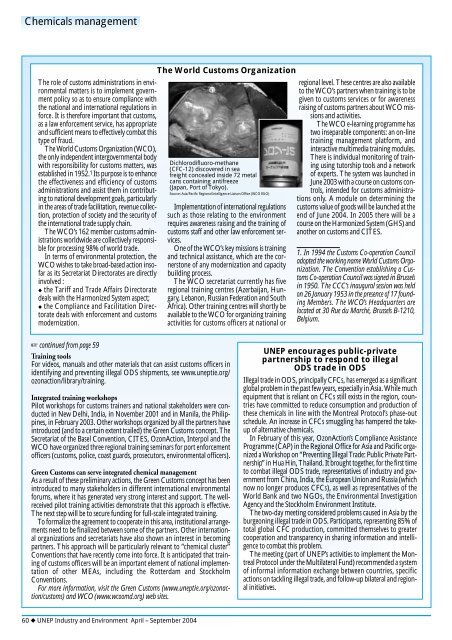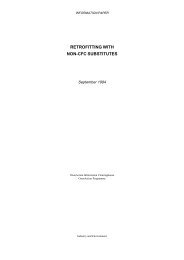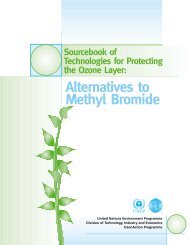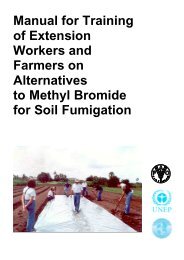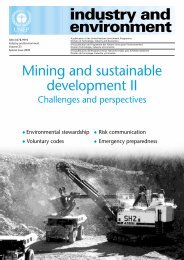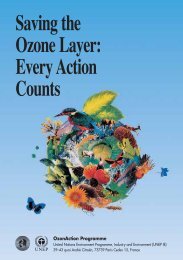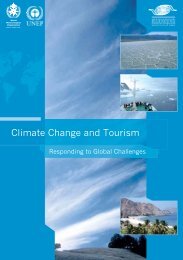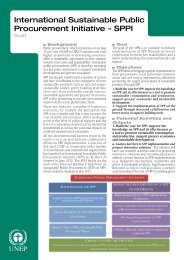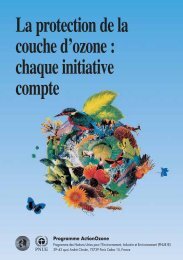industry and environment - DTIE
industry and environment - DTIE
industry and environment - DTIE
Create successful ePaper yourself
Turn your PDF publications into a flip-book with our unique Google optimized e-Paper software.
Chemicals management<br />
The role of customs administrations in <strong>environment</strong>al<br />
matters is to implement government<br />
policy so as to ensure compliance with<br />
the national <strong>and</strong> international regulations in<br />
force. It is therefore important that customs,<br />
as a law enforcement service, has appropriate<br />
<strong>and</strong> sufficient means to effectively combat this<br />
type of fraud.<br />
The World Customs Organization (WCO),<br />
the only independent intergovernmental body<br />
with responsibility for customs matters, was<br />
established in 1952. 1 Its purpose is to enhance<br />
the effectiveness <strong>and</strong> efficiency of customs<br />
administrations <strong>and</strong> assist them in contributing<br />
to national development goals, particularly<br />
in the areas of trade facilitation, revenue collection,<br />
protection of society <strong>and</strong> the security of<br />
the international trade supply chain.<br />
The WCO’s 162 member customs administrations<br />
worldwide are collectively responsible<br />
for processing 98% of world trade.<br />
In terms of <strong>environment</strong>al protection, the<br />
WCO wishes to take broad-based action insofar<br />
as its Secretariat Directorates are directly<br />
involved :<br />
◆ the Tariff <strong>and</strong> Trade Affairs Directorate<br />
deals with the Harmonized System aspect;<br />
◆ the Compliance <strong>and</strong> Facilitation Directorate<br />
deals with enforcement <strong>and</strong> customs<br />
modernization.<br />
The World Customs Organization<br />
Dichlorodifluoro-methane<br />
(CFC-12) discovered in sea<br />
freight concealed inside 72 metal<br />
cans containing antifreeze<br />
(Japan, Port of Tokyo).<br />
Source: Asia/Pacific Regional Intelligence Liaison Office (WCO RILO)<br />
Implementation of international regulations<br />
such as those relating to the <strong>environment</strong><br />
requires awareness raising <strong>and</strong> the training of<br />
customs staff <strong>and</strong> other law enforcement services.<br />
One of the WCO’s key missions is training<br />
<strong>and</strong> technical assistance, which are the cornerstone<br />
of any modernization <strong>and</strong> capacity<br />
building process.<br />
The WCO secretariat currently has five<br />
regional training centres (Azerbaijan, Hungary,<br />
Lebanon, Russian Federation <strong>and</strong> South<br />
Africa). Other training centres will shortly be<br />
available to the WCO for organizing training<br />
activities for customs officers at national or<br />
regional level. These centres are also available<br />
to the WCO’s partners when training is to be<br />
given to customs services or for awareness<br />
raising of customs partners about WCO missions<br />
<strong>and</strong> activities.<br />
The WCO e-learning programme has<br />
two inseparable components: an on-line<br />
training management platform, <strong>and</strong><br />
interactive multimedia training modules.<br />
There is individual monitoring of training<br />
using tutorship tools <strong>and</strong> a network<br />
of experts. The system was launched in<br />
June 2003 with a course on customs controls,<br />
intended for customs administrations<br />
only. A module on determining the<br />
customs value of goods will be launched at the<br />
end of June 2004. In 2005 there will be a<br />
course on the Harmonized System (GHS) <strong>and</strong><br />
another on customs <strong>and</strong> CITES.<br />
1. In 1994 the Customs Co-operation Council<br />
adopted the working name World Customs Organization.<br />
The Convention establishing a Customs<br />
Co-operation Council was signed in Brussels<br />
in 1950. The CCC’s inaugural session was held<br />
on 26 January 1953 in the presence of 17 founding<br />
Members. The WCO’s Headquarters are<br />
located at 30 Rue du Marché, Brussels B-1210,<br />
Belgium.<br />
☞ continued from page 59<br />
Training tools<br />
For videos, manuals <strong>and</strong> other materials that can assist customs officers in<br />
identifying <strong>and</strong> preventing illegal ODS shipments, see www.uneptie.org/<br />
ozonaction/library/training.<br />
Integrated training workshops<br />
Pilot workshops for customs trainers <strong>and</strong> national stakeholders were conducted<br />
in New Delhi, India, in November 2001 <strong>and</strong> in Manila, the Philippines,<br />
in February 2003. Other workshops organized by all the partners have<br />
introduced (<strong>and</strong> to a certain extent trailed) the Green Customs concept. The<br />
Secretariat of the Basel Convention, CITES, OzonAction, Interpol <strong>and</strong> the<br />
WCO have organized three regional training seminars for port enforcement<br />
officers (customs, police, coast guards, prosecutors, <strong>environment</strong>al officers).<br />
Green Customs can serve integrated chemical management<br />
As a result of these preliminary actions, the Green Customs concept has been<br />
introduced to many stakeholders in different international <strong>environment</strong>al<br />
forums, where it has generated very strong interest <strong>and</strong> support. The wellreceived<br />
pilot training activities demonstrate that this approach is effective.<br />
The next step will be to secure funding for full-scale integrated training.<br />
To formalize the agreement to cooperate in this area, institutional arrangements<br />
need to be finalized between some of the partners. Other international<br />
organizations <strong>and</strong> secretariats have also shown an interest in becoming<br />
partners. This approach will be particularly relevant to “chemical cluster”<br />
Conventions that have recently come into force. It is anticipated that training<br />
of customs officers will be an important element of national implementation<br />
of other MEAs, including the Rotterdam <strong>and</strong> Stockholm<br />
Conventions.<br />
For more information, visit the Green Customs (www.uneptie.org/ozonaction/customs)<br />
<strong>and</strong> WCO (www.wcoomd.org) web sites.<br />
UNEP encourages public-private<br />
partnership to respond to illegal<br />
ODS trade in ODS<br />
Illegal trade in ODS, principally CFCs, has emerged as a significant<br />
global problem in the past few years, especially in Asia. While much<br />
equipment that is reliant on CFCs still exists in the region, countries<br />
have committed to reduce consumption <strong>and</strong> production of<br />
these chemicals in line with the Montreal Protocol’s phase-out<br />
schedule. An increase in CFCs smuggling has hampered the takeup<br />
of alternative chemicals.<br />
In February of this year, OzonAction’s Compliance Assistance<br />
Programme (CAP) in the Regional Office for Asia <strong>and</strong> Pacific organized<br />
a Workshop on “Preventing Illegal Trade: Public Private Partnership”<br />
in Hua Hin, Thail<strong>and</strong>. It brought together, for the first time<br />
to combat illegal ODS trade, representatives of <strong>industry</strong> <strong>and</strong> government<br />
from China, India, the European Union <strong>and</strong> Russia (which<br />
now no longer produces CFCs), as well as representatives of the<br />
World Bank <strong>and</strong> two NGOs, the Environmental Investigation<br />
Agency <strong>and</strong> the Stockholm Environment Institute.<br />
The two-day meeting considered problems caused in Asia by the<br />
burgeoning illegal trade in ODS. Participants, representing 85% of<br />
total global CFC production, committed themselves to greater<br />
cooperation <strong>and</strong> transparency in sharing information <strong>and</strong> intelligence<br />
to combat this problem.<br />
The meeting (part of UNEP’s activities to implement the Montreal<br />
Protocol under the Multilateral Fund) recommended a system<br />
of informal information exchange between countries, specific<br />
actions on tackling illegal trade, <strong>and</strong> follow-up bilateral <strong>and</strong> regional<br />
initiatives.<br />
60 ◆ UNEP Industry <strong>and</strong> Environment April – September 2004


